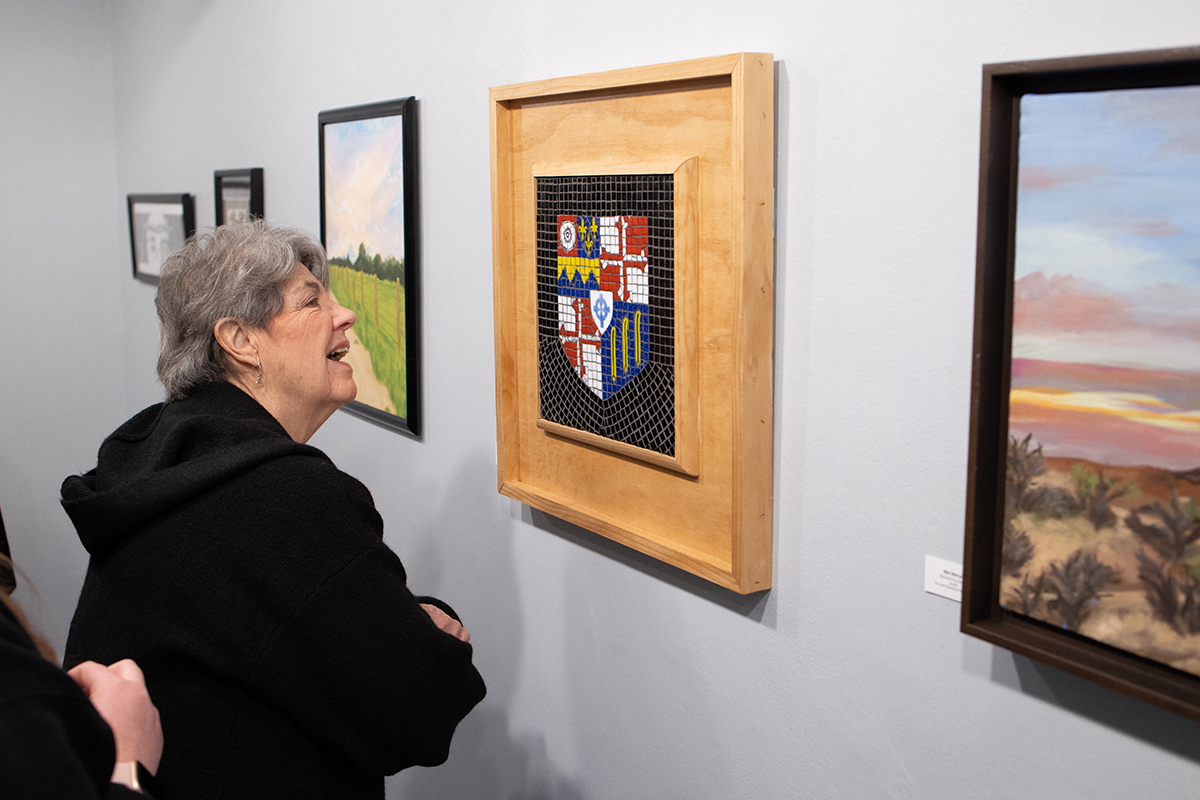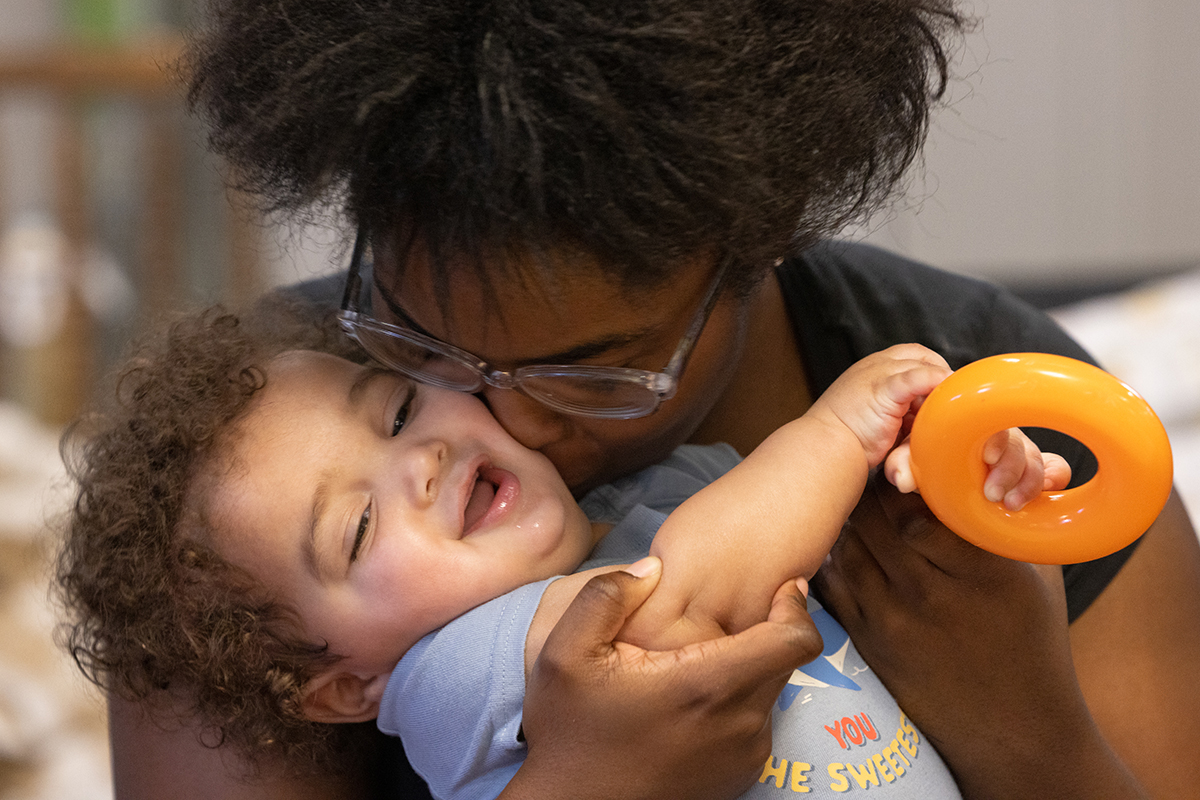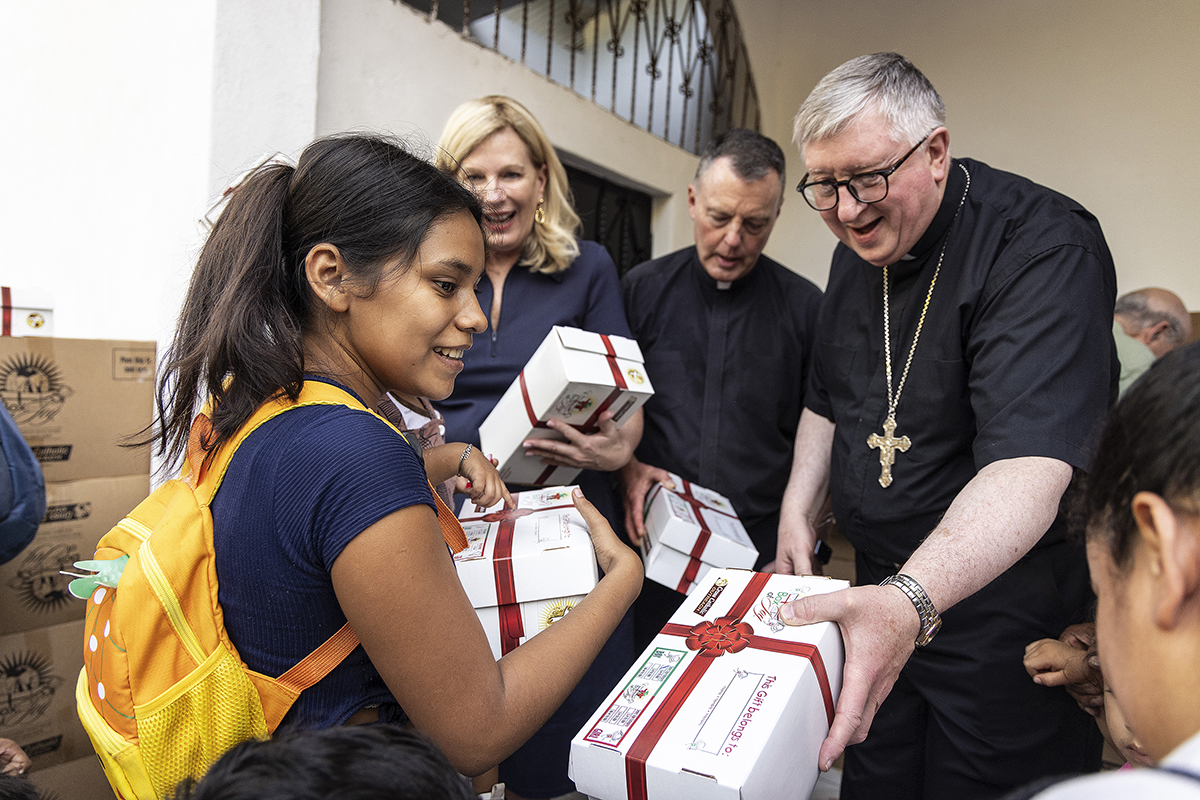Through anointing of the sick, the Church offers special grace and strength to the ill and dying
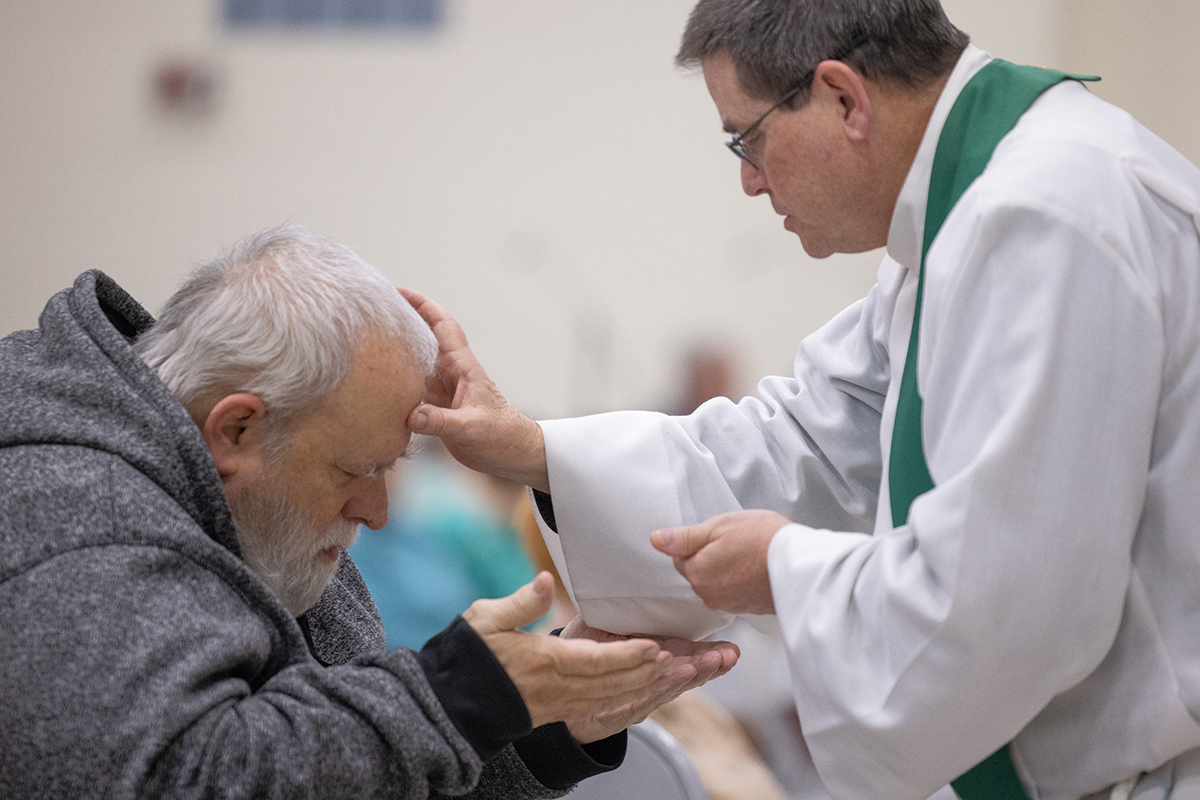
Through anointing of the sick, the Church offers special grace and strength to the ill and dying
A few years back, Father Gerald Blessing was called to offer the anointing of the sick to a dying parishioner.
At the man’s bedside, Father Blessing anointed him and gave him Communion. As he prayed the last words of the final prayer, the man breathed his last.
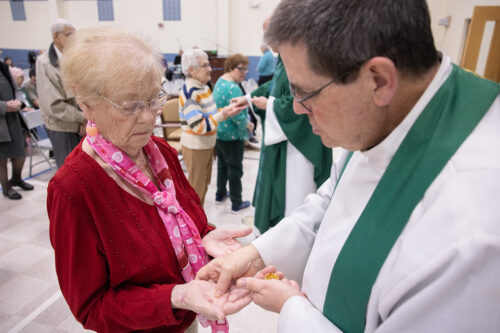
“His whole family was around the bed, and it was moving for the whole family to experience it together,” he said. “Their dad had such a great faith, and they knew how important it was to him.”
Of course, it doesn’t always happen that way. Death can be unpredictable, and the sacrament of anointing of the sick isn’t just for those who are minutes away from their final breaths.
Either way, through this sacrament of healing, the Church offers special grace to those who are ill or weakened by old age, said Father Blessing, pastor of Holy Family Parish in Arnold.
“When I’m anointing people, there’s a lot of times where someone will be so anxious or so upset. There can be so much fear when it comes to a procedure or when they are dying,” Father Blessing said. But after they are anointed, a calm enters them, he said. “And I can leave knowing this person received peace today.”
A sacrament of healing
Anointing of the sick is one of two sacraments of healing in the Church, along with reconciliation. Its roots are found in Jesus’ healing ministry, then taken up by the apostles:
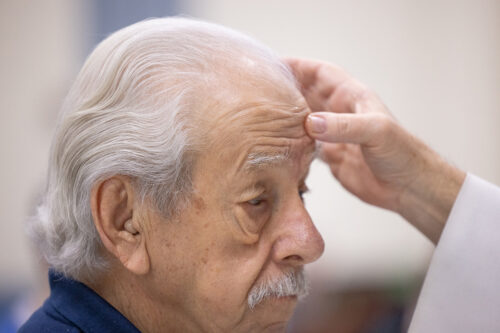
“Is any among you sick? Let him call for the presbyters of the Church, and let them pray over him, anointing him with oil in the name of the Lord; and the prayer of faith will save the sick man, and the Lord will raise him up; and if he has committed sins, he will be forgiven” (James 5:14-15).
Anointing of the sick can only be offered by a priest or bishop. During the celebration of the sacrament, the priest lays his hands on the sick person and anoints them with the oil of the sick, one of three holy oils blessed by the archbishop at the annual Chrism Mass on Holy Thursday and distributed to parishes throughout the archdiocese. The holy oil is a sign of the sick person’s connection to the entire Body of Christ and communion of saints.
It’s possible that the sacrament can bring about physical healing — the rite includes prayers for that — but its primary purpose is to unite the sick person more closely to Jesus and His passion and resurrection.
Jesus did not heal every sick person while He was on earth, the Catechism of the Catholic Church notes. “His healings were signs of the coming of the Kingdom of God. They announced a more radical healing: the victory over sin and death through His Passover. On the cross Christ took upon Himself the whole weight of evil and took away the ‘sin of the world,’ of which illness is only a consequence. By His passion and death on the cross Christ has given new meaning to suffering: it can henceforth configure us to Him and unite us with His redemptive passion” (CCC 1505).
While anointing of the sick often summons images of deathbeds, a person doesn’t have to be at the end of life to receive the sacrament. Catholics whose health is seriously impaired by sickness or old age, who are facing surgery for a serious illness or have become notably weakened even without a serious illness can be anointed. The Church does not specify exactly what constitutes a serious illness, leaving discretion to the priest who is administering it.
A person can receive the sacrament more than once in their lifetime, if they recover from their illness and then become sick again, or if during the same illness, the condition becomes more serious.
And, when death is imminent, anointing of the sick is also part of the “last rites,” which also includes reconciliation (if the person is able) and a final reception of the Eucharist, known as “viaticum” (“provisions for the way”).
After the 4 p.m. Vigil Mass on Feb. 8, a few dozen parishioners stayed to receive the anointing of the sick at Holy Family Parish in Arnold.
One by one, they filed up to Father Blessing and retired priest-in-residence Father John Brennell, who laid hands on each person and anointed their foreheads and the palms of their hands with holy oil.
“Through this holy anointing, may the Lord in His love and mercy help you with the grace of the Holy Spirit. May the Lord who frees you from sin save you and raise you up,” the priests prayed as they traced the sign of the cross.
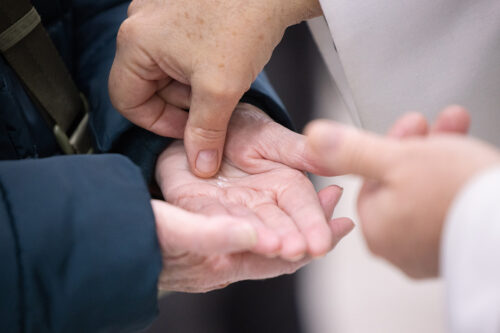
Holy Family Parish offered the sacrament in coordination with weekend Masses Feb. 8-9 ahead of the World Day of the Sick, celebrated annually on Feb. 11, the feast of Our Lady of Lourdes.
In his message for the World Day of the Sick, Pope Francis reflected on how God remains close to those who are sick and suffering and offers strength through the times of trial.
“When Jesus sent the seventy-two disciples out on mission, he told them to proclaim to the sick: ‘The kingdom of God has come near to you.’ He asks them, in other words, to help the sick to see their infirmity, however painful and incomprehensible it may be, as an opportunity to encounter the Lord,” Pope Francis wrote. “In times of illness, we sense our human frailty on the physical, psychological and spiritual levels. Yet we also experience the closeness and compassion of God, who, in Jesus, shared in our human suffering. God does not abandon us and often amazes us by granting us a strength that we never expected, and would never have found on our own.”
Not alone
Anointing of the sick — like all the sacraments — is “a statement that God is with us on this journey,” Father Brennell said.
At the Mass on Feb. 8, Father Brennell encouraged parishioners who were not staying to receive anointing to pray for those who were. It’s a beautiful witness to celebrate the sacrament in the church, where “you feel the strength of the community,” he said. “They are a sign that I’m not doing this alone.”
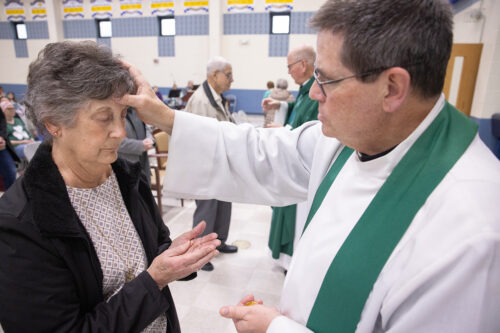
Calls to anoint someone can come at any hour of the day while a priest is in the middle of any number of things, Father Brennell said. In his experience, fellow parishioners always understand and support the need to drop whatever is going on to go offer the sacrament.
“If (Father Blessing) is in a finance meeting, and he gets a call and says he needs to go, people say, ‘go.’ Because we want that. We want a sign of the Church’s presence,” he said.
Those who are sick and suffering need to know that the Church remains close to them and is walking alongside them, he added.
“We’re all going to die to this world, and very few of us are going to get away without any suffering in the world, but to do it alone would be a truly sorrowful thing. So it’s the way the Church is saying, you’re not alone,” Father Brennell said. “But more importantly, it’s the way God is saying, I understand. I know what’s going on in your life right now. I care about your sickness. I’m not saying I’m going to change it all, but you’re not doing this alone.”
Matter and Form:
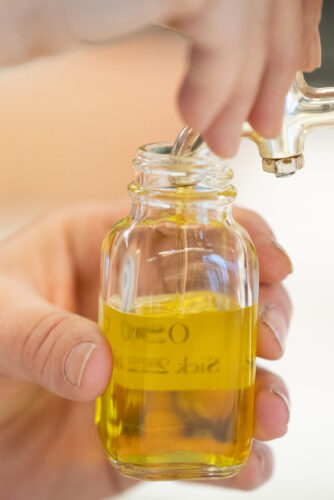
The oil of the sick (oleum infirmorum) is one of three holy oils blessed by the archbishop at the annual Chrism Mass and distributed to parishes throughout the archdiocese. The priest uses the oil to anoint a sick person’s head and the palms of their hands.
The priest prays these words: “Through this holy anointing, may the Lord in His love and mercy help you with the grace of the Holy Spirit. May the Lord who frees you from sin save you and raise you up.”
The celebration of the sacrament can also include a penitential rite and a Liturgy of the Word.
Effects of the sacrament:
•A particular gift of the Holy Spirit: Strengthening, peace and courage to overcome the difficulties that go with the condition of serious illness or the frailty of old age. Sins which weren’t able to be confessed in the sacrament of reconciliation are also forgiven.
•Union with the passion of Christ: The sick person receives the strength and gift of uniting himself more closely to Christ’s passion, giving the suffering new meaning as participation in the saving work of Jesus.
•Ecclesial grace: By celebrating the sacrament the Church, in the communion of saints, intercedes for the benefit of the sick person, and they, for their part, through the grace of the sacrament, contributes to the sanctification of the Church and to the good of all men for whom the Church suffers and offers herself through Christ to God the Father.
•A preparation for the final journey: The sacrament completes our conformity to the death and resurrection of Christ, just as Baptism began it. This last anointing fortifies the end of our earthly life like a solid rampart for the final struggles before entering the Father’s house.
— Information from the Catechism of the Catholic Church, 1520-1523
Subscribe to Read All St. Louis Review Stories
All readers receive 5 stories to read free per month. After that, readers will need to be logged in.
If you are currently receive the St. Louis Review at your home or office, please send your name and address (and subscriber id if you know it) to subscriptions@stlouisreview.com to get your login information.
If you are not currently a subscriber to the St. Louis Review, please contact subscriptions@stlouisreview.com for information on how to subscribe.


